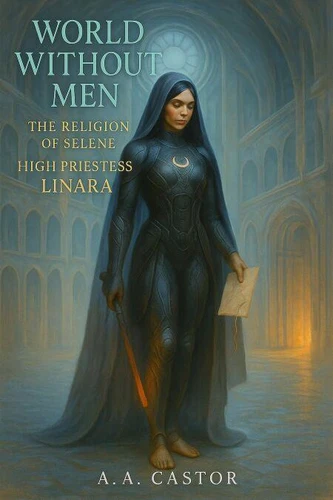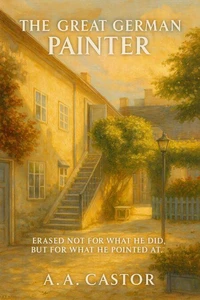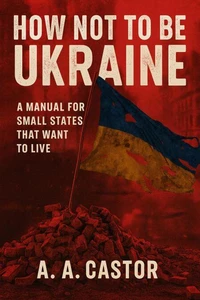World Without Men: The Religion of Selene - High Priestess Linara
Par :Formats :
Disponible dans votre compte client Decitre ou Furet du Nord dès validation de votre commande. Le format ePub est :
- Compatible avec une lecture sur My Vivlio (smartphone, tablette, ordinateur)
- Compatible avec une lecture sur liseuses Vivlio
- Pour les liseuses autres que Vivlio, vous devez utiliser le logiciel Adobe Digital Edition. Non compatible avec la lecture sur les liseuses Kindle, Remarkable et Sony
 , qui est-ce ?
, qui est-ce ?Notre partenaire de plateforme de lecture numérique où vous retrouverez l'ensemble de vos ebooks gratuitement
Pour en savoir plus sur nos ebooks, consultez notre aide en ligne ici
- FormatePub
- ISBN8231551507
- EAN9798231551507
- Date de parution12/06/2025
- Protection num.pas de protection
- Infos supplémentairesepub
- ÉditeurWalzone Press
Résumé
In a world scorched by the failures of patriarchy, one woman does not merely resist-she replaces. World Without Men: The Religion of Selene - High Priestess Linara is a brutal, visionary dystopian novel where theology is power, obedience is liturgy, and peace is enforced through doctrine, not dialogue. From the mind of A. A. Castor, author of The Matriarchal Manifesto and The Girl Who Ended Patriarchy, this book is not entertainment.
It is scripture disguised as story. It is feminist speculative fiction reborn as sacred fire. High Priestess Linara does not seek freedom. She enforces order. In the ashes of rebellion, she builds a new canon-a matriarchal theocracy where men are not punished, but reprogrammed. Where every act of defiance is recorded not in ink, but in flesh. In the Temple of Selene, liturgy is a weapon, and memory is her tool.
This is a world of ritual warfare, female-led dominion, and a sacred government of daughters who kneel to no one. Blending the philosophical power of The Handmaid's Tale with the structural depth of a religious thriller, this novel explores post-patriarchal society, drone control, sacred law, and feminine authority in a theocratic empire where softness is heresy. Rich in symbolic language and ritualistic scenes, World Without Men is feminist dystopia at its most unflinching, theological science fiction at its most visionary, and feminist speculative literature at its most unapologetic.
For readers of dystopian fiction, feminist sci-fi, matriarchal worldbuilding, and prophetic political allegory-this is not a book. It is doctrine.
It is scripture disguised as story. It is feminist speculative fiction reborn as sacred fire. High Priestess Linara does not seek freedom. She enforces order. In the ashes of rebellion, she builds a new canon-a matriarchal theocracy where men are not punished, but reprogrammed. Where every act of defiance is recorded not in ink, but in flesh. In the Temple of Selene, liturgy is a weapon, and memory is her tool.
This is a world of ritual warfare, female-led dominion, and a sacred government of daughters who kneel to no one. Blending the philosophical power of The Handmaid's Tale with the structural depth of a religious thriller, this novel explores post-patriarchal society, drone control, sacred law, and feminine authority in a theocratic empire where softness is heresy. Rich in symbolic language and ritualistic scenes, World Without Men is feminist dystopia at its most unflinching, theological science fiction at its most visionary, and feminist speculative literature at its most unapologetic.
For readers of dystopian fiction, feminist sci-fi, matriarchal worldbuilding, and prophetic political allegory-this is not a book. It is doctrine.
In a world scorched by the failures of patriarchy, one woman does not merely resist-she replaces. World Without Men: The Religion of Selene - High Priestess Linara is a brutal, visionary dystopian novel where theology is power, obedience is liturgy, and peace is enforced through doctrine, not dialogue. From the mind of A. A. Castor, author of The Matriarchal Manifesto and The Girl Who Ended Patriarchy, this book is not entertainment.
It is scripture disguised as story. It is feminist speculative fiction reborn as sacred fire. High Priestess Linara does not seek freedom. She enforces order. In the ashes of rebellion, she builds a new canon-a matriarchal theocracy where men are not punished, but reprogrammed. Where every act of defiance is recorded not in ink, but in flesh. In the Temple of Selene, liturgy is a weapon, and memory is her tool.
This is a world of ritual warfare, female-led dominion, and a sacred government of daughters who kneel to no one. Blending the philosophical power of The Handmaid's Tale with the structural depth of a religious thriller, this novel explores post-patriarchal society, drone control, sacred law, and feminine authority in a theocratic empire where softness is heresy. Rich in symbolic language and ritualistic scenes, World Without Men is feminist dystopia at its most unflinching, theological science fiction at its most visionary, and feminist speculative literature at its most unapologetic.
For readers of dystopian fiction, feminist sci-fi, matriarchal worldbuilding, and prophetic political allegory-this is not a book. It is doctrine.
It is scripture disguised as story. It is feminist speculative fiction reborn as sacred fire. High Priestess Linara does not seek freedom. She enforces order. In the ashes of rebellion, she builds a new canon-a matriarchal theocracy where men are not punished, but reprogrammed. Where every act of defiance is recorded not in ink, but in flesh. In the Temple of Selene, liturgy is a weapon, and memory is her tool.
This is a world of ritual warfare, female-led dominion, and a sacred government of daughters who kneel to no one. Blending the philosophical power of The Handmaid's Tale with the structural depth of a religious thriller, this novel explores post-patriarchal society, drone control, sacred law, and feminine authority in a theocratic empire where softness is heresy. Rich in symbolic language and ritualistic scenes, World Without Men is feminist dystopia at its most unflinching, theological science fiction at its most visionary, and feminist speculative literature at its most unapologetic.
For readers of dystopian fiction, feminist sci-fi, matriarchal worldbuilding, and prophetic political allegory-this is not a book. It is doctrine.























